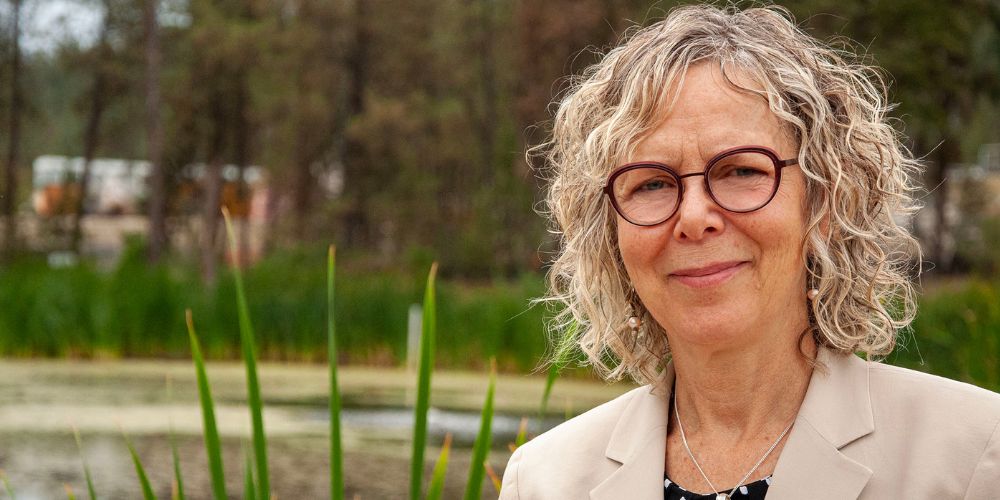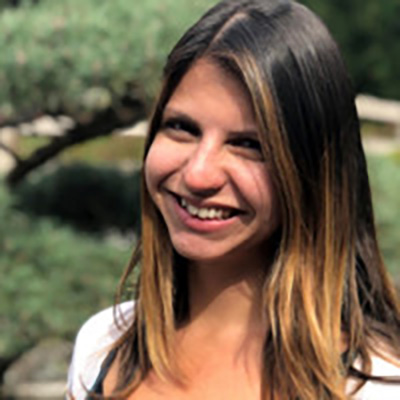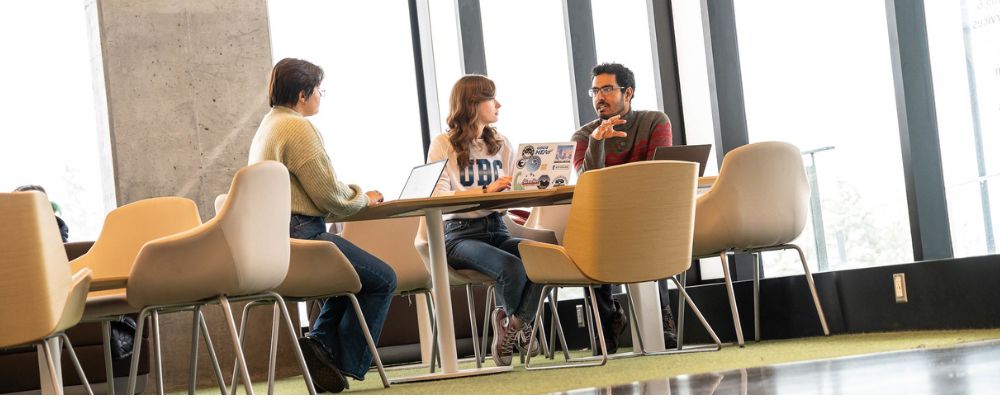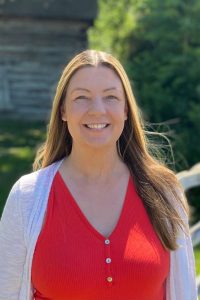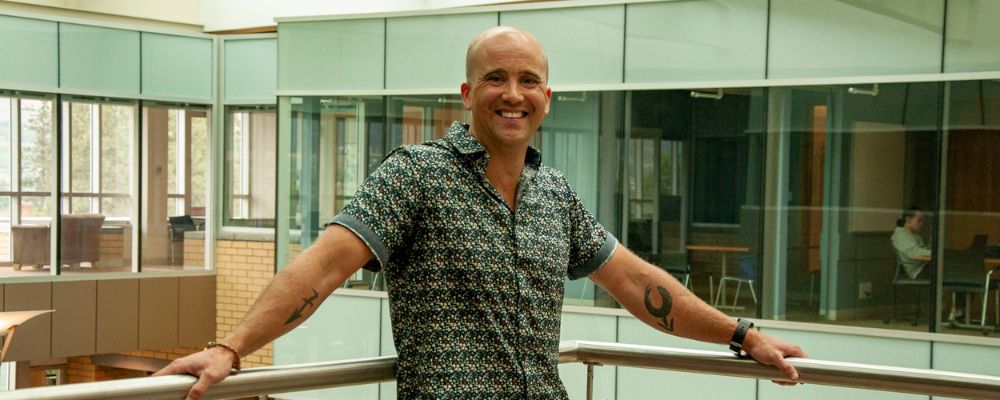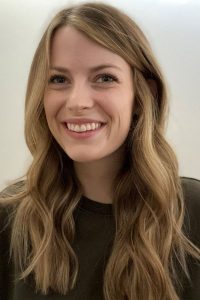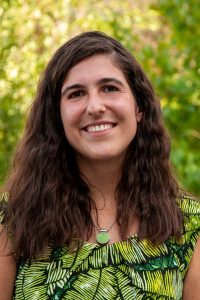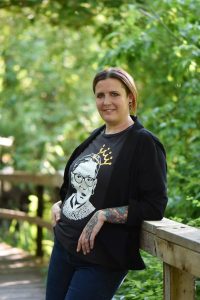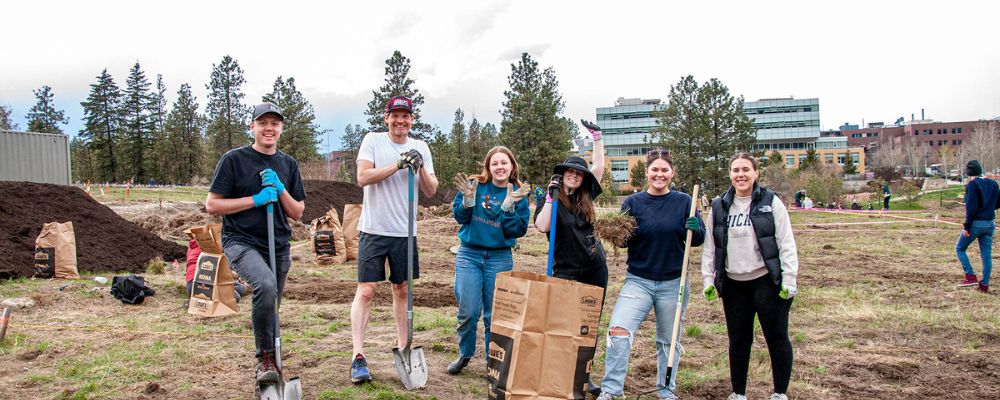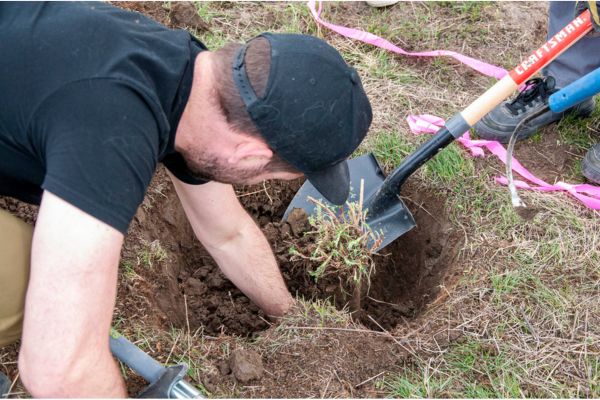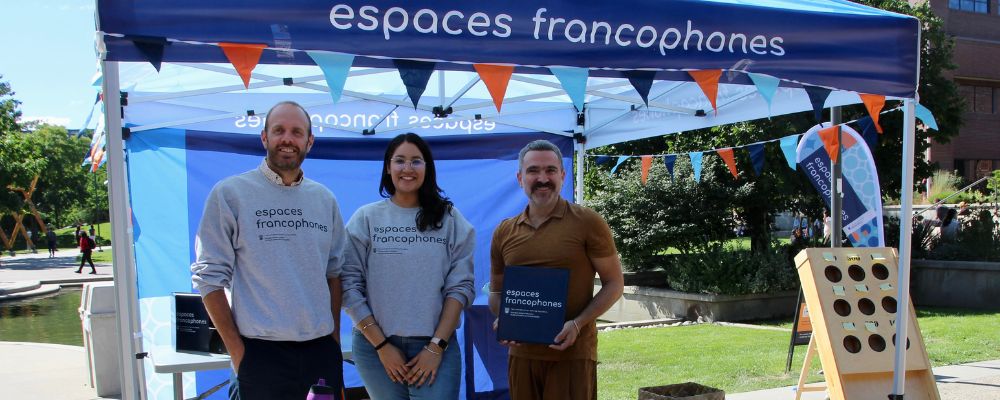Congratulations to our Sharon McCoubrey Award in Visual Arts recipient and 2021/2022 Bachelor of Education graduate, Nicole Labrecque!
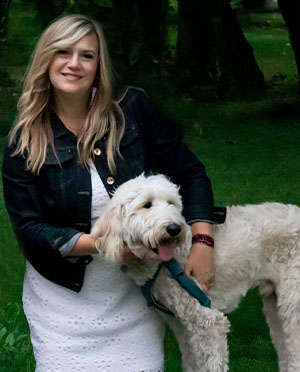
This is what her nominator had to say:
“Nicole’s instructional planning is admirable with clear learning intentions focused on competency development and creativity. Learning is intentionally designed to foster artistic attributes. Nicole actively participates in relevant professional development opportunities and demonstrates openness to feedback. She has also shared her artistic strengths with colleagues, helping develop an ongoing professional learning community. Additionally, Nicole authentically integrates First Peoples’ Principles of Learning into lesson design, using interdisciplinary and land-based approaches.”
“Receiving this award was a really big surprise,” says Nicole. “There are moments in the classroom, where you wonder where it’s all going, and is this headed in the right direction? So receiving this award brought me so much joy. It’s very affirming and encouraging to receive an award for teaching — and visual art teaching, making it extra special for me.”
***
As the oldest child in her family, Nicole Labrecque had a natural draw to taking care of others and helping people. While growing up in Richmond, BC on the traditional, ancestral, unceded territory of the Musqueam First Nation, she found herself at an early age inspired to pursue teaching.
“I had a couple of really excellent teachers,” Nicole reflects. “One was a humanities teacher who empowered us to think for ourselves, and the other was a drama teacher who empowered us to create our own work. My drama teacher supported me in writing and directing my own play — and we took it to a provincial competition!”
Following high-school, Nicole pursued her Bachelor of Fine Arts degree from UBC Vancouver. At the time, there weren’t many teaching positions available, so Nicole’s career path changed and she worked as a professional costume designer. After several years, Nicole and her family moved to Edmonton, AB. During her time there, she went to the University of Alberta (U of A) where she received her Master of Fine Arts in Theatre Design. Following graduation, she continued on with U of A as an instructor within the Drama Faculty — teaching costume design and the history of decor. She was also a part-time art educator at a local gallery, and it was that position that re-kindled her interest.
“Students would come to the gallery for field trips and we would have studio time and create art together. It was those moments that re-ignited that teaching interest for me. I would wonder, ‘what would it look like to teach art full-time?’,” says Nicole.
After spending 10 years in Edmonton, Nicole and her family moved to Kelowna, BC in 2019. The move to Kelowna provided Nicole with the opportunity to pursue her dream of becoming a teacher as she had family support and the nearby UBC Okanagan campus offered a Bachelor of Education.
Now as she’s set to cross the stage soon, Nicole reflects on her time in the program and highlights her key takeaways.
“One thing I learned that really resonated with me, and I realized had been informing my life, but I didn’t have words for it, is social emotional learning or SEL. I realized that SEL is at the heart of teaching arts, visual arts, and drama. I think it’s at the heart of teaching in a broad perspective, but particularly in areas that are really personal. Ones that allow for a lot of personal expression and exploration where the processes are as important, if not more important, than the product.”
Nicole also appreciated the opportunities that were offered by Dr. Bill Cohen to learn more about Indigenous ways of knowing and being.
“Those lessons have really impacted me. I think I’ll always be circling back to learn more, especially the stories.”
During Nicole’s final internship, she was placed at Mount Boucherie Secondary School, teaching visual art to grades 10 to 12 and assisting with the yearbook.
“Teaching art to high-school level students who are choosing to be there is a phenomenal experience. There were times where it wasn’t easy, but it’s the challenging situations where you grow. I learned so much during my placement, particularly on the idea of studio habits of mind, which is an approach that I learned. It’s the idea that we’re helping create, foster and nurture artists. We’re giving them a space to explore within some structures. I had an amazing mentor and I learned some really good approaches to balancing the structured school environment with something that’s very open-ended.”
For future Bachelor of Education students, Nicole has some advice to share:
“Be really open to all of the learning. It’s okay to feel a little uncomfortable. Even when you have to take math and you want to be an art teacher. Even that experience helped me grow. Some of the program’s experiences are designed to help you conquer fears or develop your confidence in areas that are outside of your comfort zone. And when you feel outside of your comfort zone, just know that you’re not alone! Don’t be scared to reach out to your professors, because they are really nice people.”
***
About the Sharon McCoubrey Award in Visual Arts Teaching
Associate Professor Emeritus Sharon McCoubrey created the award to be presented to a Bachelor of Education student who has demonstrated leadership and passion for creativity with a commitment to advancing the teaching of visual arts in elementary schools.
Recipients of the Sharon McCoubrey Award provide artwork for a limited edition mentor teacher appreciation certificate.
Artist Profile
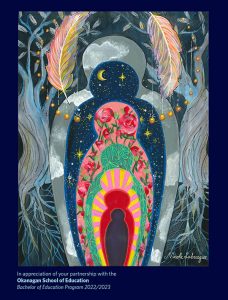
Nicole is an educator and artist of Croatian ancestry. She spent her childhood in Richmond, BC, on the traditional, ancestral, unceded territory of the Musqueam First Nation. She received her Bachelor of Fine Arts degree from UBC Vancouver. After working as a professional costume designer in Vancouver, she went on to obtain her Master of Fine Arts degree from the University of Alberta in Edmonton, staying on to teach as an instructor within the Drama Faculty. In 2019, she moved back to BC along with her husband Cory and daughter Mateya, to be closer to family in the Okanagan. She is a recent graduate of the 2021/22 UBCO Bachelor of Education program with teachable subjects in Visual Arts, Drama and Textiles. In recent years, she has switched her focus from theatre design to visual art, and her current practice focuses on painting. She enjoys working in various media such as acrylic, oil, encaustic and mixed media.
This piece, “Seven Generations,” is created with a combination of fluid acrylics and paint markers; the subject matter explores transformation, possibility, identity and intergenerational healing.
